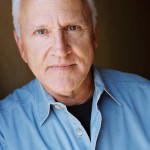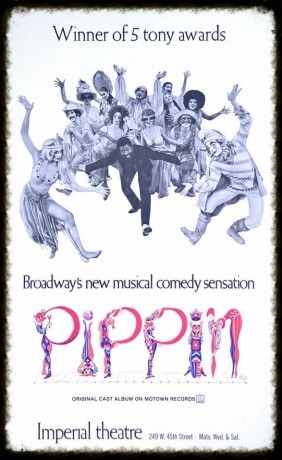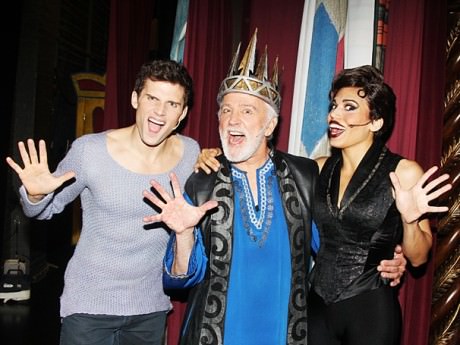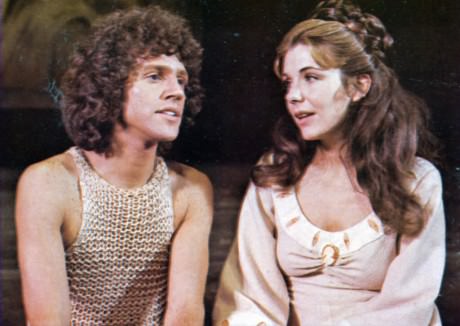
[Editor’s Note: Press Night for The National Tour of Pippin is tonight at The National Theatre in DC, and John Rubenstein is here to play King Charlemagne direct from The Tony Award-winning Broadway production. Teresa McCormick Ertel interviewed John right after he began performances on Broadway (June 19, 2014 – August 24, 2014).. Here’s her interview:
Actor, director, teacher, and composer John Rubinstein has taken on the role of King Charlemagne in the critically acclaimed Tony Award-winning revival of Pippin until the end of July. He’s Broadway’s original Pippin and here he shares his thoughts on his experience with the musical and how it feels to be king.
Teresa: How was opening night and what were you feeling and what was going through your mind before you took to the stage?
John: Well, the thought that I was having as the music was starting off was, “Why did I ever talk myself into doing this?”
Were you terrified?
I was. I remember having the same thought 32 years ago, almost to the day, when I first did Pippin at The Opera House at The Kennedy Center in DC where Pippin first opened for an out of town try out. I remember standing backstage, looking at this giant set that we had that Tony Walton designed, thinking, “Why did I ever let myself get into this?” That panic, that is the actor’s nightmare, that I’ll walk out onstage and not have a clue what I’m doing.
So, how did it go?
In DC it went well, and the other night went quite well, too.
At what point in the show did you realize, “OK, I can relax, this going to be alright, and I’m ready?”
I didn’t (laughs). I still haven’t quite gotten there. I’ve done the show five times now. The fourth and fifth times I had a few moments where I breathed and said to myself, “Everything’s going to be ok.” But, onstage, especially in the big group numbers, I still have this feeling of, “Oh my God, I feel like I’m standing in the wrong place bumping into people and somebody’s gonna die.”
I can imagine that it’s a little different this time around with the added “cirque” elements. How do you feel about the acrobatics and the effects?
Well, it’s a completely different take on the show. The story is still there, of course. You know I always related the old production to Shakespeare’s Macbeth. The image that Shakespeare chose of those three weird sisters, whom we call the witches. They do magic and you know, [to quote them]“Double, double toil and trouble.” They tell things to Macbeth that startle, surprise, scare and inspire him. And he moves through the story of that play, very much motivated by those three weird sisters. He tells his wife about them and she buys into it, and finally they lead him to destruction. So what are they? Are they three strange gypsies, fortune tellers that actually live there in Scotland and know what’s going to happen? Or are they the interior dark workings and forces of his own mind?
I see the parallel and similar idea behind the players, who are they, do they exist or are they part of Pippin’s mind. That’s part of why my family adores this show, because of the open interpretation. My daughters’ art school did an eerie and wonderful production of it this year, with a steampunk element costume design and minimalist set that was more like the original -without the circus performance elements. The new slant offered by the revival is brilliant and absolutely beautiful to watch. Do you feel the story remains intact?
Yes, it’s basically the same, but the main difference is the ending. Stephen Schwartz and Roger Hirson changed the ending of the play several years ago. The original ending had Pippin defeating the players. They were beaten at the end. The dragged away the scenery and chased away the orchestra. So Pippin and Catherine and the little boy are left, like Dustin Hoffman and Katherine Ross [in the film The Graduate] at the end of the day. They are thinking of the future saying, “Now what?”
They didn’t bring the ending around full circle as they do in the revival?
No. In Washington {the ’72 opening) they had a little uplift at the end, which was a favorite for me. After the orchestra and players were gone, Jill Clayburgh, who played Catherine, would turn to me and say something like, “Well Pippin, how do you feel now?” I would think for a long minute and I would say, “…Trapped.” And the audience would howl with laughter. I guess because at that moment they were expecting Pippin to say, “I realize that I love you and that love is more important than anything else, blah blah blah,” And I didn’t. Everyone would laugh because they could relate to that feeling of being trapped in our lives and [feeling as though] perhaps we didn’t achieve what we wanted to achieve, and feel trapped in the limited world that we ended up in. Maybe my wife doesn’t seem to like me all that much anymore, and when I was a little boy, I wanted to be a fireman or a marine or a rock star.

After that, I said, softly, and with simultaneous hope and discovery, “… which isn’t too bad for the end of a musical comedy.” Then, I slowly, tentatively, and tenderly raised their hands in mine — tiptoeing into our brave new world together — and sang, high and very soft, almost whispered, “Ta-daahh!”
The audience was enthralled, they loved it, and we got rave reviews in Washington, DC.
When we moved it to New York, [Director] Bob Fosse, a couple of nights before we open, comes up to me and says, “John, cut ‘But happy.’” I said, “Oh my God, really? Those key little words are what save the evening. That’s what makes Pippin…
The hero?
Yeah, He’s defeated the powers of darkness and he’s smart enough to realize that he hasn’t accomplished what he wants, he’s trapped in it, and he’s happy about it. And that is really what the journey is. Fosse said, Nah, nah, that’s sentimental bullshit, don’t say it (laughs).
So for the 5 years that we played on Broadway, we didn’t say, “But happy.” And for the national tour, no “But happy.” It was just “Trapped…which isn’t too bad for the end of a musical comedy.” And I felt the audience reaction was more flat. Our reviews were more negative in New York. They loved Fosse’s choreography, they loved [Lead Player] Ben Vereen, they loved the sets and the costumes, but not necessarily the show.
How do you feel about the ending used now in the revival?
I’m in the show and part of that new ending now and I love playing it with all my heart. I feel so fortunate and proud to be in this production. I’m looking forward to the national tour. I’m going to take it all across the country and I love it. As a dramaturge, as a director, as a critic, I would say, no, we don’t need Pippin and Catherine to walk away blithely, and little Theo, the little boy, to stay behind and get swept up by those same players. It’s more a of a negativist point of view.
You have the benefit of knowledge of the variety of endings, and what it was originally, but you agree that this one works as well.
Oh, yes! I get it and it’s not and it’s not at all illegitimate, it’s just that I’m an old man and I grew up as Pippin with his journey as a foolish adolescent, full of himself, and he ends it with a little bit more humility, a little bit more sense of what’s actually true in life and what actually has value. In the current ending the message is more that life is a cycle, you reach the heights, you fall to the depths, and the next guy is waiting right behind you. It works and the audience is enthralled, they love it! They scream, they shout, they stand up at the end, they laugh, they love it.
Yes, we loved it, as well, and the audience gets to come full circle with that haunting music from the opening scene. It’s an eerie and ironic ending. I also get your point that the original ending takes on a journey of Pippin with a different resolution. Both are just brilliant.
Diane Paulus, the director and I had a long talk and she is an artist of great integrity. She absolutely believes in what she has created with the writer, and I buy it, I absolutely accept it and was convinced by what she said. Two different ideas and endings, and there’s nothing wrong with that.

So now that you are Charles, is there anything that you recall from Fosse’s direction of Eric Berry (originator of the role) that you are using or have called upon for your portrayal?
Yes, I have to say, I did the show with him for two and a half years and just by osmosis I took it in. To me Eric Berry is Charlemagne, you know, so when I am up there saying his lines, I’m not imitating him because I am a completely different entity than he was, but I definitely feel his dignity, his pride, his coldness and cruelty that he put into it. I’m channeling that somewhere, although this version of the play is also very different for Charlemagne. He’s a different guy, he’s a circus performer, a knife thrower. But I can feel, coursing through my veins, Eric Berry’s performance in there somewhere.
Do you portray Charlemagne as a bit of the likeable father figure or more as one of the players that is tasked with leading Pippin to his doom?
Well, both. It’s this weird little play that can be interpreted on all these different levels. On one level, I am the veteran, the oldest of the circus performers. I’ve been with the troupe forever. We do Pippin and maybe we even do twenty other different plays and we travel around and we try to get an audience member to do this magic scene. In the old days, it was thought of as a fatal scene, but now it’s not thought of in quite the same way. You do this act of daring, sort of like reality TV or like Jerry Springer, the kind of thing where you get people to watch something that is very much staged, as all those reality TV shows are. During the commercials they coach them, like “Come on now you’ve got to get up and you’ve got to go punch that girl and then we’ll have our people come pull you off of her, but you’ve got to do something.”
What a fantastic analogy of Pippin to reality TV. I’ve never thought about it that way, but that’s a brilliant analogy.
So Pippin is sort of the ancient version of doing that. Setting up in a town, doing amazing acrobatic tricks, magic, and illusions, and trying to lure one of the townspeople into a reality situation where they’re going to defy death and do an amazing climax number. And if we don’t get that done, than we don’t get paid. So it’s terribly important to me, as this old knife throwing actor, to pick up this kid and do what we’re supposed to do.
How is the knife throwing going? Did you have a lot of training and preparation for that?
I worked very hard at that and it wasn’t easy at all. Every night that is one of the things that I’m most nervous about. If it goes flying from the stage then I look like an idiot. But then, I am an old guy. I [as Charlemagne] could be the old drunken actor and when I was thirty something I could fly them like an ace, but now I’m sixty something and I’m losing it. I’d feel ashamed that I can’t throw my knives well anymore. So far, though, I’ve done them great, so I’m OK (laughs).
So, you are going to be touring for at least a year with Pippin after your Broadway stint ends at the end of July?
Yes, after July 27th we will rehearse for the tour, here in New York, and then we open in Denver in September.
We won’t miss that and will make a point to see you on tour. I have to say, I think it’s just a genius casting decision to have the original Pippin come full circle and play the king. Who came up with that?
I think it may have been my wonderful agent in New York, Michael Rodriguez.
How do you like to spend your downtime in New York City, when you are on Broadway?
Well, I haven’t had any downtime yet (laughs). I’ve done a lot of Broadway shows. At times when I’ve worked here, my kids were going to school here. This is my favorite schedule, 8 shows a week, you know, and especially in New York City. There is just nothing like that feeling. If you grew up in this town like I did, as an actor, wanting to do this and being allowed to be in a Broadway show, it’s wonderful. Right now, it’s my day off, I’m sitting in a beautiful little park, all of these people are out here having their lunch, and I get to do a Broadway show tomorrow night!
What’s your advice for young actors and students now, who have that goal… that dream to be on Broadway?
I teach at USC. I’ve taught there for six years and I teach musical theater and I direct the big spring musicals. I’m obviously taking a sabbatical to do this show. I try to instill in all my students a respect and love of not only the process and the virtue of performing, but of the history. Know the history, know the old musicals. Listen to all the musicals from the 30’s, 40’s and 50’s, 60’s and 70’s. Don’t just listen to Spring Awakening and Hairspray, go back and listen to Cole Porter, George Gershwin, Rodgers and Hammerstein, Rodgers and Hart. Listen to all the shows and get to know them. Learn the stories and listen to the original Broadway recordings of them. Learn all of that stuff, learn it and know it and feel it.
Even if you are in a small town, go to the community theater, see whatever they are putting on. Look at the road shows that come through, like I’m going to be coming through all these towns, with the tour. If you get to New York, drag your parents to the theater. So that by the time you are in college and getting out of college, you are not just some person who can sing or who can dance, you are someone who actually knows the material and knows the world they want to become a part of. The time that is spent texting friends and writing on Facebook, is time that could be spent listening to Mary Martin sing South Pacific.
What shows have you chosen to direct for the spring musicals at University of Southern California?
Well, I’ve done six now. I did Brigadoon, Into the Woods, On the Town, City of Angels, The Most Happy Fella…
I don’t know that one.
Oh, that’s Loesser, his masterpiece. Well, Guys and Dolls, I guess is his masterpiece, but The Most Happy Fella is almost like an opera with a fantastic, beautiful score, one of the most beautiful scores ever written for Broadway. The last musical we did was Grand Hotel. Fantastic show.
As a director, is there something you think is due for a revival? You mentioned all these wonderful musicals of history and have such a vast knowledge, so what do you think might be due to come back around? What should come back to Broadway?
Oh my God. Wow, I have to think about that. Well, just a couple of years ago, they did do A Little Night Music. I love A Little Night Music. I would like to do Ragtime. To me, it’s the show that should be the perennial New York show. Not Phantom of the Opera, not Cats, and not Les Mis, and not The Lion King. I respect all of those shows, but the show that should never close and should attract tourists from all over the world to come to New York City is Ragtime. I think they revived it and it didn’t go so well. But, it’s a show that’s about the history of the United States, the history of New York City, it’s about the ethnic hodge-podge that our country is and all the difficulties that arise from that. It has glorious music and lyrics, great roles for actors. Stephen Flaherty and Lynn Ahrens wrote music that is just killer. I think that’s one of the best shows that’s been written in the last 30 years. I would love to get my hands on that show.
Have you ever directed Pippin or have you considered Pippin?
No, no, I don’t want to do Pippin.
You don’t want to direct it?
No, not yet. I may want to sometime. They keep asking me.

I’m sure, of course!
Having being in it, and working with Fosse, I wouldn’t want to imitate him and I wouldn’t want to try to reproduce what he did and I also don’t have any brilliant, brand new idea. I love what he did and what we did. I love what I’m doing now, and that’s enough for now.
Pippin is playing through January 4, 2015 at The National Theatre-1321 Pennsylvania Ave NW, in Washington, DC. For tickets call (800) 514-3849 (ETIX), by visiting the Box Office, or purchase them online.




